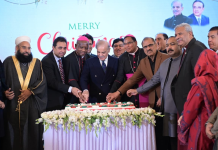BANGKOK: Anti-government protesters marched in Bangkok on Thursday in a bid to force Prime Minister Yingluck Shinawatra from office but their numbers appeared far smaller than earlier in the month, when she called a snap election to try to defuse the crisis. Protest leader Suthep Thaugsuban is demanding political and electoral reforms before any vote is held and wants these to be overseen by a “people’s council” his movement will help nominate rather than by Yingluck, who is caretaker prime minister until the election, set for Feb. 2. About 2,500 people marched along one of the city’s main roads holding banners that read “We are anti-corruption” and “No elections before reform”. Others are expected to join as they move through central business areas.
One sign read: “We will not accept Square Face”, a nickname given to former Prime Minister Thaksin Shinawatra, Yingluck’s brother and the figure at the centre of Thailand’s eight-year, on-off political crisis.
Thaksin, a former telecommunications tycoon, is adored by the rural poor because of cheap healthcare and other policies brought in while he was in power, but he was toppled by the military in 2006 and now lives in self-exile.
Yingluck won a landslide victory in 2011 and her Puea Thai Party is well placed to win the next election because of Thaksin’s enduring support in the populous north and northeast.
Ranged against them are a royalist establishment that feels threatened by Thaksin’s rise and a middle class that resents what it sees as its taxes being spent on wasteful populist policies that amount to vote-buying.
Thaksin fled in 2008 before being sentenced to jail for abuse of power in a trial he says was politically motivated.
Suthep’s movement gained impetus in early November after Yingluck’s government tried to push through a political amnesty bill that would have allowed Thaksin to return home a free man.
Rally on Sunday
After failing to get the politically influential military on his side, Suthep is trying to re-energize his supporters with marches this week and a rally on Sunday.
“We are warming up our engines for Suthep … so that he can apply more pressure, peacefully, until Yingluck decides to step down,” said Pasvut Ittikul, a former strategist for Yingluck’s party who resigned to join Suthep’s protest.
Suthep massed 160,000 protesters around Yingluck’s office on December 9, when she called the snap election, and occupied several ministries and other state buildings before that, but police estimate that no more than 2,000 people are now camped out at the main protest sites in Bangkok’s historic quarter.
A court has issued an arrest warrant for Suthep on a charge of insurrection but police have done nothing to apprehend him, despite his appearance at a seminar with the military and other public events.
However, on Wednesday, the Department of Special Investigation, Thailand’s equivalent of the US FBI, said it would ask banks to freeze the accounts of 18 rally leaders, including Suthep, to investigate what it called suspicious transactions.
Suthep says he wants to wipe out vote-buying and electoral fraud and has also promised “forceful laws to eradicate corruption”, decentralisation, the end of “superficial populist policies that enable corruption”, and the reform of “certain state agencies such as the police force”.
Even if the vote goes ahead on Feb. 2, its legitimacy could be undermined if the main opposition Democrat Party does not take part. At a conference this week, its members could not agree whether to run in the election or back the protests.
Democrat lawmakers resigned from parliament this month to march with Suthep, who was a deputy prime minister in a Democrat-led government until 2011.
Some agree with his call for reforms to be implemented before another election is held, but others believe their party, Thailand’s oldest, should respect the democratic process and run for office. A decision is expected on Saturday.











